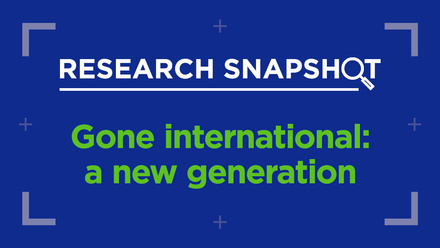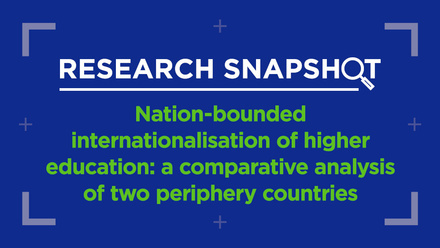7 principles for balanced North–South mobility

North–South student mobility programmes tend to focus too much on the benefits for the European student and are unable to clearly demonstrate how they can be of added value to local communities and Global South partners. This raises many ethical challenges: Are mobility programmes with asymmetrical power relations reproducing an aid logic, strengthening attitudes of superiority and having adverse effects on development processes? This possibility is alarming, especially as these programmes are increasing in popularity and are expected to expand exponentially in the coming years.
Research has demonstrated the high added value of these mobility programmes for European students in terms of personal growth, global citizenship, intercultural skills and international experience. But we need to ask ourselves critically: What is the added value of student mobility for receiving countries? Despite making promises on decolonisation and equality, few European higher education institutions are ready for and capable of truly reciprocal partnerships.
We need to ask ourselves critically: What is the added value of student mobility for receiving countries?
A critical examination of such programmes, based not only on international research but also on dialogue with Global South partners, is long overdue. It is vital to put forward fundamental principles – which, in the decolonial spirit, should be co-written with Southern partners – in order to make mobility more equitable and beneficial for all parties involved. The following seven principles are among those that should guide such North–South collaboration.
1. Equal collaboration
The age of ‘bringing development’ is over, particularly through projects, research dissertations and internships. This is not the students’ role, and the inherent belittling and paternalising that come with this attitude should end. Mobility is about working together on global challenges and understanding that our fates are intertwined. The old ‘aid paradigm’, with its donor logic and embedded white saviourism, is severely outdated. Instead, we should move towards equal collaboration on a common agenda, with shared responsibility and in a context of joint learning.
Mobility is about working together on global challenges and understanding that our fates are intertwined
However, by opting to collaborate as equals, we risk masking the large inequality that still prevails in many cases, which may lead to great frustration for the host country partners. A North–South relationship must recognise the inherent imbalance in terms of power, opportunities, knowledge, privilege and income between the partners. This demands insight and thorough reflection by Global North students before their departure.
2. Long-term vision
The aim should always be to institutionally embed partnerships and to take on a long-term vision that facilitates mutual learning and accountability. Partners should commit to measuring and evaluating the impact of the process in the long term, leaving room for errors, growth, disappointments and critical reflection on responsibilities and benefits on both sides. The long-term focus is crucial so that students can continue each other’s work (and learn from each other’s mistakes), creating the necessary trust in the partnership to work towards a win–win situation for everyone involved.
Higher education institutions are either in it for the long run, building capacity on both sides, or are not in it at all. Furthermore, in order to reduce power imbalances, it is important to establish broad networks that go beyond bilateral partnerships and North–South logic. This gives the Global South partner the ability to raise concerns in a multi-stakeholder forum rather than within an aid-like scenario.
3. Ownership
More than ever, there is a need to move beyond discourse and properly implement ownership. If institutions and communities in the Global South cannot (co-)determine the content of the partnership, such as the selection of Global North students, the research task they may or may not complete on the ground, the preparation they must receive before departure and the appropriate duration of the mobility, it is all hollow talk.
4. Meaningful contact
Mobility programmes should be evaluated on their ability to create meaningful and dignified contact between all parties. Achieving positive interpersonal relationships is a crucial aim in itself and as important as achieving subject-related competences of students. These close interpersonal relationships are not automatically established but require intercultural insights that should be acquired before departure. Relationships are negatively impacted by short mobility programmes, lack of knowledge of local languages, large student groups and oversupply of students in popular volunteer hubs. Strict selection of students and host country partners is therefore paramount.
5. Intercultural training
No student should leave Europe without first receiving obligatory, meaningful, critical and deep intercultural training. The consensus within the literature on the positive impact of such training on the learning capabilities of students, and their eventual relationship and contribution to host communities, is overwhelming.
A minimum of the following themes and ethical dilemmas should be addressed during pre-departure training: individual motivation, reflection on identity and gender, intercultural competences, reflection on frames of reference and privileges, knowledge of global inequality, history of development cooperation, complexity of poverty and social exclusion, white saviour complexes, racism, and the context and history of the host country. This list and the complexity of the topics show that such training should take considerable time and investment, should be embedded within curricula and should be co-developed with the host country partner.
6. Children’s rights
Mobility programmes must pay much closer attention to potential negative impacts on vulnerable children, with human and children’s rights taking centre stage. Despite good intentions, short visits by Global North students to groups of children may disrupt the necessary continuity of care, leading to possible attachment difficulties and psychological problems. Students often don’t possess the relevant knowledge and experience to deal with such complex situations. It is therefore recommended to follow the advice of ChildSafe: "Do not work directly with children." The focus must be on the well-being of children and their rights, not on students’ desire to visit and meet vulnerable children.
7. Ecological impact
Finally, close attention must be given to the ecological impact of mobility programmes. If not, it feels like ‘greenwashing’: institutions serving organic vegetables in the canteen while sending multiple students around the world each year on short, possibly not beneficial projects. Purely from an ecological standpoint, if we decide to fly around the world, let us guarantee that the mobility programmes serve not only the students but also our international partners and communities.
Transformative power
If attention is paid to the above principles, North–South mobility programmes will absolutely possess the transformative power to bring people of all walks of life, backgrounds, genders and classes together in order to solve global challenges.
The task for European higher education institutions is a difficult but nonetheless clear one: if they truly want to decolonise their partnerships and mobility programmes, they must move beyond contested terminology and lengthy internal debates, and towards sound policy and action as described above. Let’s abandon the obsessive focus on mobility outputs – an instrumentalist approach – and instead focus on high-quality programmes and their impact on partners and communities.
If not, our words and ideas will always be judged as noble but hollow.






